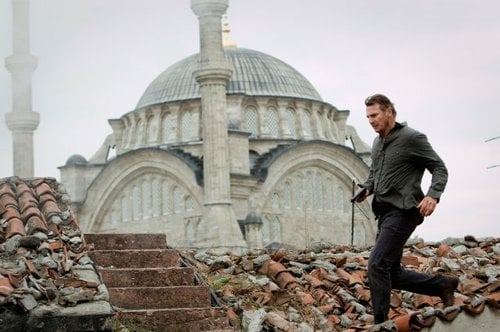 |
| This film takes place in a time when people were scared of vampires! |
1) With the casting of Darren McGavin in this role, we witness the perfect fusion of character and actor. Even though the role was not written with him in mind, Carl Kolchak seems tailor made for McGavin's hardboiled sensibilities, resulting in a reporter who seems to harken back to an earlier time, a man who believes in breaking past the truth....resulting in him knowing the secrets of the universe and, Cassandra-like, being shunned for it.
2) And it's fortunate McGavin--whose prior claim to fame was playing Mike Hammer on television--fit the role so well, because so much of Richard Matheson's excellent script is structured like a hardboiled crime film in its pacing, its language and its visual look. And because the first act of the film plays like a straight detective story about a serial killer stalking Las Vegas, the ultimate revelation about who and what Janos Skozeny is becomes all the more shocking.
3) You know, Gail is pretty much a thankless task assayed by a mediocre actress in Carol Lynley...but it has to be admitted that she has a real chemistry with McGavin, and gives us a very rare aspect of the character we don't get in either the sequel or the television series that resulted from this film's success. Seeing her interact with Carl softens him slightly and grounds him as a human being--thus giving those moments where he's desperate and scared have more impact.
4) Another thing that makes this film so unique is the way director John Llewellyn Moxey goes with a cinema verite style. The way the scenes play out in the first twenty minutes of the film seems so naturalistic....and yet there are these weird, strange elements in these very same scenes. It's another reason why the film feels real to us, making the surreal elements feel all the more shocking when they emerge.
 |
| Down these mean Las Vegas Streets one of the greatest characters in televsion history drives..... |
5) ...and another thing that helps create the veracity of this film? We don't see Barry Atwater's Janos Skorzeny until over twenty minutes of the movie's seventy-five minutes running time, and don't see him clearly until thirty minutes. That's an eternity when you take into account this was designed to run with commercial breaks. It makes us almost accept that this might be a legitimate crime thriller about a killer he thinks he's a vampire...until we see Atwater's shadowy over-the-shoulder form strangling a german shepherd while its owner looks on frozen in fear.
6) One of the genius touches of Matheson's script is something that becomes a hallmark of the character--namely, the little character sketch of each victim we get before she makes her disappearance. It further re-enforces the film noir atmosphere of the movie and gives us a degree of sympathy for what amounts to cannon fodder. And given each mini-essay is being recited in McGavin's wonderfully world-weary and cynical voice...well, it works.
7) You know, even though the film has that wonderful score by Robert Cobert that's this combination of jazz and electronic howls and screams, I love how so much of the movie happens quietly. There are long stretches where the only sound is the dialogue and ambient background noise. Moxey trust the script so much he allows it to stand out unsweetened by music--something that would never happen in the modern day.
 |
| Anyone wh knows their film noir knows this triumph will end up leaving a bitter taste in Kolchak's mouth... |
8) This film also benefits one hundred percent from being shot recognizably on location in Las Vegas. The shots of Kolchak driving down the Strip, or of these people wandering through the casinos once more add to the reality of the story and makes it feel realer than other comtemporary horror films.
9) As much as I love McGavin's portrayal of Kolchak, I suspect I wouldn't love it so much if he wasn't paired up with Simon Oakland's Vincenzo. It's not just that McGavin and Oakland's chemistry is palatable, or that they both play up to and subvert the cliche of their roles...it's that the tension between them makes the ultimate resolution of their relationship as reporter and editor all the more impactful. Oakland's entire role plays up to that single line...'You're a Hell of a reporter,' and when we hear that line, delivered in that way, we know what's about to happen is Not Going To Be Good.
10) ...which brings us to the ending, and I love how dark it is. Kolchak saves the city, and is thanked with the threat of prison, his story being suppressed, being forcibly separated from his fiance' and run out of town. This is absolutely in keeping with the film noir world view that Curtis, Moxey and Matheson has maintained since the first moment of the story. And it leads to the exquisite last moment, where Kolchak makes a decision about what to do with what he knows, which is at turns funny and appropriate.
Overall...one of my favorite television films, a film noir crime story with a strong supernatural element that has at its core one of the greatest television characters in history. Essential viewing.





